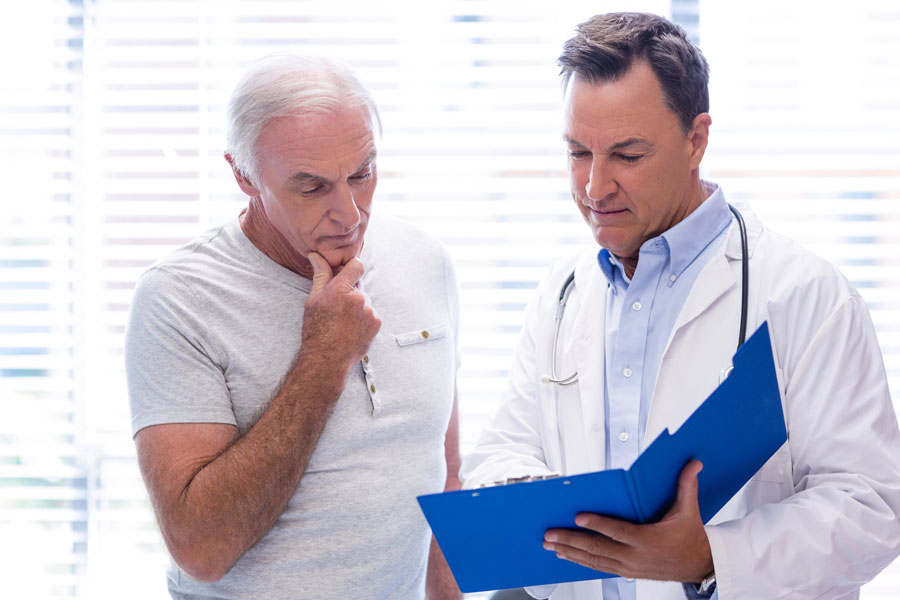Prostate Cancer Questions to Ask Your Doctor
At Sperling Prostate Center, we encourage patients and their loved ones to ask questions. However, many times patients may not be able to put their concerns into words. They aren’t sure what to ask.
To help get you started, below are suggested questions listed by topic. Click on each blue bar for a drop-down list of questions. Dr. Sperling and our staff are happy to address your questions, because every question deserves an answer.
Before Your Prostate MRI
Your doctor and his team should be able to reassure you that MRI is radiation-free, make you comfortable with going through the scan, and explain what is meant by “significant prostate cancer” and why MRI excels at identifying it.
- What do I need to do to prepare?
- How long will the scan last?
- What if I’m claustrophobic?
- Is there any radiation or side effects from MRI?
- Do you use an endorectal coil?
- Will I need an IV injection of a contrast agent?
- Can the MRI tell me if I have prostate cancer?
- What’s the difference between insignificant and significant prostate cancer?
- Why is MRI better at finding significant prostate cancer?
- What else can it tell me about my prostate gland?
After Your Prostate MRI
Your doctor should review your personal MRI results, help you understand your report in user-friendly terms, and recommend next steps.
- What did the MRI reveal? Can you show me and explain it?
- On my written report, what is the PI-RADS score? What does it mean for me?
- Have you identified areas you think are tumors?
- What next steps do you recommend?
Before Your Biopsy
Your doctor should address any fears or concerns you have about the biopsy and side effects. He/She should also explain the difference between TRUS guidance, Fusion MRI Guidance, and Real-Time MRI guidance for biopsies, describing how in-bore MRI is today’s best targeting “guidance system.” He/she should let you know when and how you can expect results.
- What do I need to do to prepare?
- How do you manage pain?
- How do you target needles into the areas you think are tumors?
- How many needles do you use?
- How do you know you have hit the suspicious areas adequately?
- What are the side effect risks?
- Are there any activity restrictions after the biopsy?
- Where do you send my slides for analysis?
- When can I expect the results?
After Your Biopsy
A diagnosis of prostate cancer can be scary, but today’s success rates are higher than ever. Your doctor should spell out your diagnosis in words you can understand. Your doctor should encourage you to ask questions, and answer them to your satisfaction. He/she should help guide you in matching treatment options to your personal case, including your lifestyle preferences, for the best chances of success and satisfaction. He/She should allow you time for second opinions if you feel you need them and should not make you feel rushed in your treatment decision.
- If my report was positive for prostate cancer, what does Gleason grade (or Grade Group) mean? How is it different from PI-RADS?
- If I have prostate cancer, what stage is it? Has it started to spread?
- Do you recommend a second opinion on my slides? If so, where and how can I get one?
- Do you recommend any further analysis of my slides, such as genomics?
- If my report was positive for prostate cancer, what are my treatment choices?
- Am I a candidate for Active Surveillance? If so, how would I be monitored?
- Am I a candidate for a focal treatment? If so, what are my choices? How would I be monitored?
- Are you comfortable with me exploring other treatment options and speaking with other specialists (urologists, radiation oncologists, medical oncologists) before deciding upon a final plan of action?
- What next steps do you recommend?
Before Your Treatment
While no treatment has 100% guaranteed results, it helps to know you’re in experienced hands. Knowledge is power. Your doctor should be transparent about his/her experience and results, and make you fully aware of what you can expect and any risks involved.
- How many patients have you treated?
- What kind of results have your patients had?
- Why am I a good candidate for this treatment?
- What do I need to do to prepare?
- What are the benefits and risks of this treatment?
- Are there short-term side effects? What about longer-term side effects?
- How long is the recovery period?
- Are there any activity restrictions during recovery?
After Your treatment
An often-overlooked part of cancer treatment is preparation for the unforeseeable chance that cancer can recur (come back). Be open with your doctor about any worries you have. Your doctor should be able to address them and reassure you of future options.
- How would I know if my cancer comes back?
- Do I need to monitor for the rest of my life?
- If my cancer comes back, what are my treatment choices?


Take the next step today
Request your free consultation with Dr. Sperling, and we’ll work together to make the best diagnostic and treatment plan for you.
Contact us

